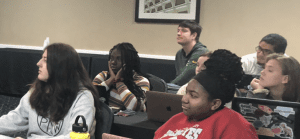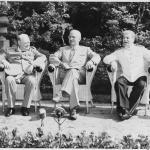The Decline of History Scores
The National Assessment of Educational Progress has reported that 8th graders in the United States scored lower on their History and Civics assessment than they have since the Department of Education started testing for this in 1994. Should we panic about this decline and the potential weakening of our civic education?
You would think that historians would be the first to lift their voices in outrage. But because of our skills at context and historical thinking—and even perhaps at civic discourse, we will be among the last to get on the bandwagon in decrying young people today. This is first of all because of the actual data: the score this year is only one point lower than it was in 1994 (the peak score was in 2014), and there are many good reasons for students whose 4th -7th grade years were interrupted by the pandemic to have performed more poorly than their predecessors.
Second, it may be that civil discourse is indeed on the decline, but this is unlikely to be the fault of elementary education or even that of high school. Social science research seems to lean in the direction of blaming our current lack of civility on social media and the algorithms that prevent us from engaging face to face on the local level in our city or county politics. Lack of knowledge of US government or history is less the challenge for decline in our citizenship goals than the social realities formed by Meta, Google, and TikTok.
Still, it’s an old adage that all great battles within the US are fought first in our schools. Public schools, especially the “free compulsory” kind, were invented in the 19th century as way to create and cement new nations. The modern form of historical writing and research was invented in many ways to form national identity, with civics and nation-state history becoming the core of what elementary and secondary education were intended to instill in young burgeoning citizens. Concerns about who we are as a nation have shaped our history education in terms of content and approach since well before World War II.
Sam Wineburg’ s Why Learn History (When It’s All on Your Phone) has made a career thinking about how we teach history in our middle and high schools. He points out that in the middle of World War Two, the New York Times headlined a survey that showed less than 6 percent of US college students could name all 13 colonies. It is a regular concern, Wineburg argues, and goes on to demonstrate that young people (from the Silent Generation to Gen Z) are no less likely to know the important elements of US history than are their forebears. In fact, our perennial handwringing about “young people today” may be misplaced, especially when those fears are focused on specific bits of data about history.
So here we are once again, worried about our student scores. At the same time, we are making it harder for everyone to study history and we have created a culture where frank discussion of anything is anxiety-producing. This, too, is not new. Fears of outsiders, worries about national identity, concerns about cultural and political change, have been shaping the context teachers do their work in since public schools began in the nineteenth century. We ask a great deal of those we require to educate the young—as anyone who has tried to engage a classroom of twenty 14-year-olds can attest. And when those who invest the most in pushing them to think about the long view and to try to understand complex ideas and institutional structures as a group in one room at one time are forced to defend themselves and have to stress about being misunderstood or losing their jobs, we narrow the ranks of those willing to work in our schools.
Go Local
One way we could reclaim some of the joy in learning about our past and present while lowering the political temperature is to go local. We already have regional differences in how we explore our national history. When surveying my university students about their high school experience I learn that in the Western United States, middle school students learn more about the Oregon Trail, Native American history, and the Gold Rush than do their peers. New Englanders get a bit more Revolutionary War and Southerners get more Civil War. This is as it should be, with visits to local history sites, oral histories of long terms residents, and an emphasis on the past and present of the school’s civic environment.
In fact, observers of the evolution of our civic culture agree that the nationalization of state and city politics has degraded our civic engagement as well as preventing nonpartisan governance at the local level. What if our history education could teach the skills of historical thinking by emphasizing events and documents that revealed more of the community the school was in?
At the university level professors can be inundated with the desire for “relevant” history which usually tracks with whatever the controversies of the moment are. This is appropriate because sensitive thinkers do want background and context for whatever their peers are discussing. However, this is less the case for 12- and 13-year-olds, the cohort being assessed for their civic education in the latest news cycle. What an opportunity to practice and teach local history as well as governmental practice before students have been formed by global media strategies. These algorithms to automatically place any person or event young people learn about in some sort of political category with all the judgment that comes with that. A focus on the local, within the national context, along with a greater focus on regional politics, could potentially de-escalate the drama for middle school history and civics teachers.
In any case, whether or not we weather the latest storm over teaching history and civics while retaining a competent teacher corps, we can at least thank the historians of education for reminding us that this latest set of test scores need not make us feel at any greater risk than we have been at any point since 1994. However, as a Gen Xer whose 8th grade was 1988, I can feel as smug as I want to about my own generation’s super civic knowledge. There’s nothing except my own flawed memory to prevent me from claiming the class of 1992 was the very best. And that’s why we have historians to keep us from thinking that the past was always better and to encourage us to investigate our local context.














